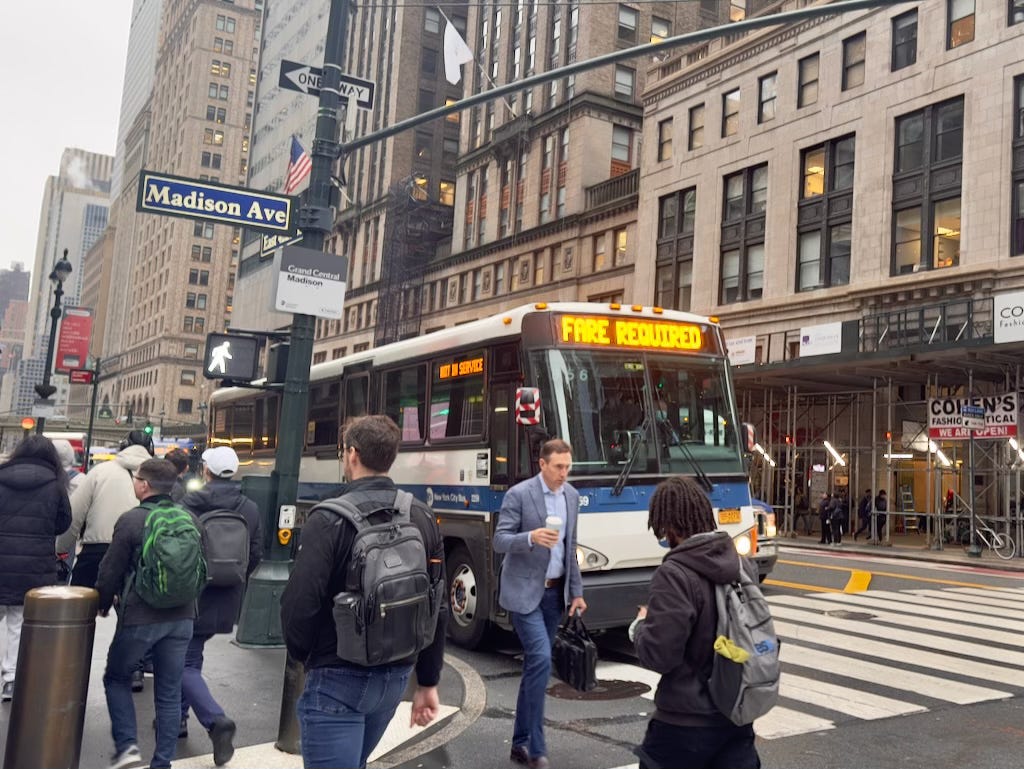Mamdani City
What happens when you stop checking fares, Mamdani’s appointments, and DSA’s next targets.
Public systems work right up until the moment they don’t. This week, we look at LA’s breakdown in fare discipline, Mamdani’s growing transition team, and the DSA maneuvering now reshaping New York’s political map, as well as why New York’s mental health system isn’t working.
What Happens When You Stop Checking Fares?
Los Angeles has become an unexpected test case in what happens when fare checks disappear. The LA Metro now estimates 46% of riders don’t pay, totaling about 12 million unpaid trips each month, according to a recent report highlighted in the Los Angeles Daily News. Though the agency employs about 200 security officers, some months they issue fewer than ten fare-evasion citations a day. That drop in enforcement began after Metro shifted responsibility away from law enforcement in 2017.
People arrested for crimes had almost always entered without paying: 96% in the last year, and as fare checks have faded, both trespassing and drug use in stations have increased. Metro riders now consistently report feeling less safe.
New York already ran one of the world’s largest real-world fare-free bus tests: from March to August 2020, all local and SBS buses were free, with fares suspended and rear-door boarding mandated to protect drivers. During those five months, bus fare payment dropped to zero, and when fares returned, evasion rates jumped.
Pre-pandemic bus fare evasion was about 15%; after the fare holiday ended, it more than doubled and has remained stubbornly high. By early 2025, about 44% of citywide bus riders didn’t pay (down from a peak of 49% in mid-2024), meanwhile subway fare evasion declined to 10%, as fare enforcement efforts intensified.
The MTA’s small fare-free bus pilot Mamdani likes to reference, saw both higher ridership and fewer driver assaults, but the agency warns of a persistent “fare discipline” problem, with possible “spillover”—the idea that even paid routes start to feel optional.
After the pandemic’s accidental experiment, LA’s experience is a reminder: when fare enforcement vanishes, so does the habit of paying.
Transition Tracker
Mamdani is expected to meet with President Trump this morning; more on that in every single paper in the city: POLITICO, The New York Times, The Post, The City, Gothamist, Crain’s.
Current Police Commissioner Jessica Tisch will stay on, Mamdani announced this week.
So far, Mamdani has announced the appointments of First Deputy Mayor Dean Fuleihan and Chief of Staff Elle Bisgaard-Church. The news was well-received across the political spectrum.
Who is Jessica Tisch?

The current police commissioner is an 18-year veteran of public service. Before joining the NYPD, she led the New York City Department of Sanitation. Earlier, she served as Commissioner of the New York City Department of Information Technology and Telecommunications, overseeing the city’s tech response to COVID-19. Before that, as the NYPD’s Deputy Commissioner of Information Technology, she modernized police operations and advanced transparency through initiatives such as body-worn cameras. She began her career in 2008 in the NYPD’s Counterterrorism Bureau.
Since taking over last November, Tisch has emphasized quality-of-life enforcement, and low-level arrests have climbed. Mamdani has indicated he may move in another direction. Asked by Gothamist whether he backs her focus on low-level offenses or sees them as preventing more serious crime, he did not give a direct answer.
Mamdani wants to reduce the police budget and expand the authority of an oversight board on discipline. Tisch, a Harvard-educated billionaire heiress and technocrat, has opposed reforms such as bail limits, strict timelines for evidence disclosure, as well as the Raise the Age law that bars juvenile defendants from being tried as adults.
You can read more about her in profiles in The New Yorker and The Times.
DSA Politics
The Democratic Socialists of America are on a roll — and may be moving too fast even for their biggest star. Mayor-elect Mamdani is urging Councilmember Chi Ossé not to run for Rep. Hakeem Jeffries’ seat, or at least for the DSA not to endorse him.
Mamdani has privately told Councilmember Alexa Avilés, who is planning on challenging Rep. Dan Goldman, having obtained DSA endorsement, that he would support and campaign for Comptroller and former mayoral candidate Brad Lander if he ran, according to three people familiar with the matter, who told The New York Times.
Public defender and DSA organizer Dalourny Nemorin is challenging Rep. Ritchie Torres.
Rep. Nydia Velázquez, 72, announced this week that she will not seek reelection, and it is expected that a DSA candidate will run for the seat.
DSA member Rana Abdelhamid files to run for Mamdani’s Assembly seat
“How many 99-unit buildings would you have to build to solve the housing crisis?” CBRE executive Mary Ann Tighe asked at a Crain’s and Real Estate Board of New York event in October. “5,050.” (Crain’s)
The Bigger Apple Podcast: Why New York’s Mental Health System Isn’t Working

In this week’s episode, we talked with Manhattan Institute senior fellow Stephen Eide, author of Homelessness in America: The History and Tragedy of an Intractable Social Problem about why New York continues to see so many visibly ill people on the streets and subways despite its right-to-shelter protections.
We looked at the history of deinstitutionalization, Medicaid’s restrictions on long-term psychiatric care, and how shelters and supportive housing function today. Stephen also described what he has observed in Norway and how that differs from the challenges New York faces as Mayor-elect Zohran Mamdani moves to create a Department of Community Safety and alter the city’s crisis-response approach.
Stephen’s advice to Mamdani:
More From MI
Tisch and Mamdani have very different approaches to crime and policing, making for a complicated alliance, Raphael Mangual writes in the City Journal. Charles Fain Lehman also has some thoughts in the New York Post.
Young People Shouldn’t Leave New York. New York Should Fix Its Cost-of-Living Crisis. The city bears much of the blame for sky-high costs, and America is poorer as a result.
The $442 Million Question: Does Having Two Train Conductors Make Subways Safer? Albany blocked one-person train operation this summer, a move that could have saved the MTA millions. It’s now up to the Governor to veto the bill.
Mamdani’s preliminary budget, due Feb. 1, will give New Yorkers their first real sense of what their new mayor will prioritize, John Ketcham writes in the New York Post.
MI Issue Brief: The Case for Mayoral Control in New York City Education
“Mayoral control has enabled New York City, the nation’s largest school district, to implement system-wide reforms that were impossible under previous governance models,” MI’s Jennifer Weber writes. “This makes it possible to carry reforms across a large city, ensure stable leadership, and follow through on long-term plans.”
Extra! Extra!

New Yorkers Stock Up On Whistles and Fill Gun Classes.
Landlords who run subsidized buildings say the numbers don’t add up.
Adams Boosts Budget, Leaving a $4.7 Billion Hole for Mamdani. Budget deficits, no provisions for federal aid cuts, and new commitments mark the departing mayor’s last word on the city’s financial plan.
Facing reduced housing powers, the City Council wants to lock in affordability rules, driving housing costs up in the process.


